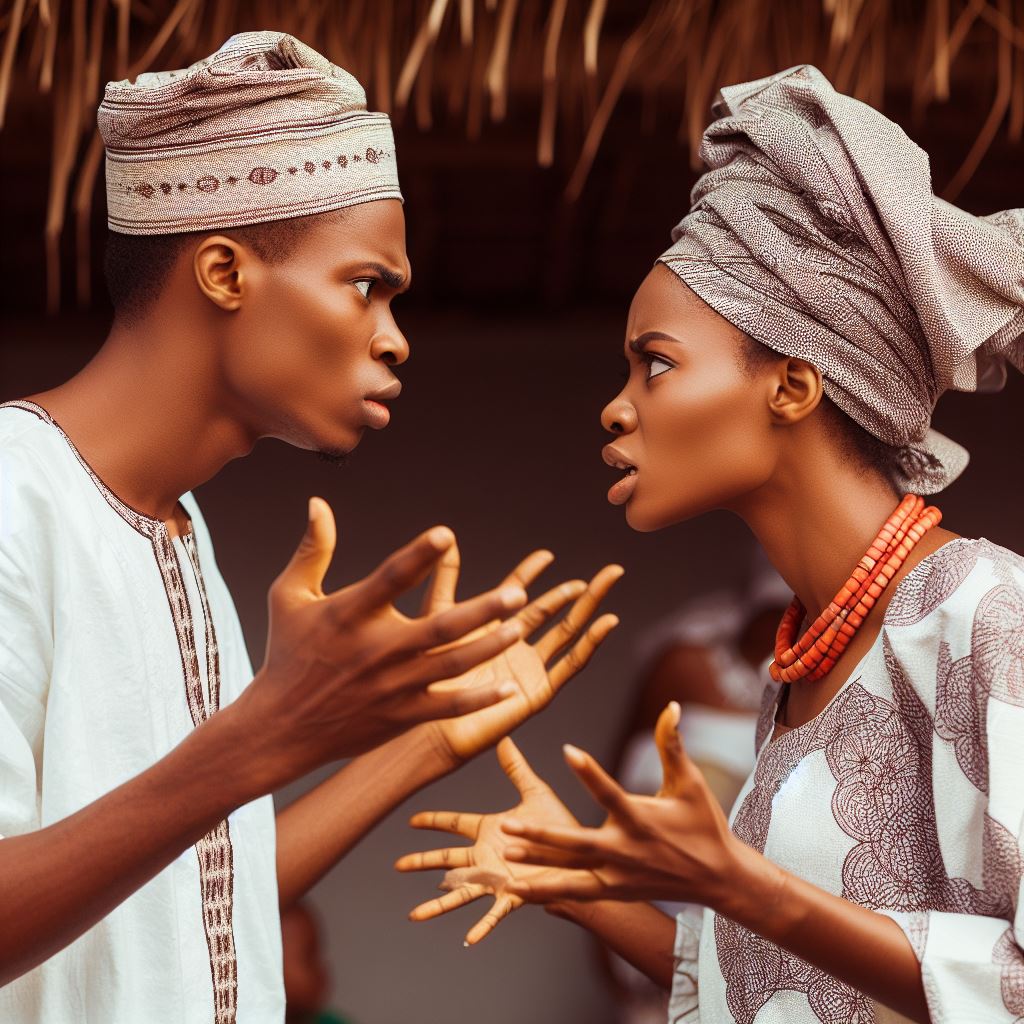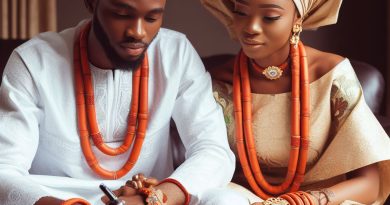The Role of Tradition in Nigerian Marital Conflicts
Last Updated on January 28, 2024
Introduction
Brief Overview of Nigerian Marriage Traditions
Nigerian marriage traditions are a tapestry of diverse cultures, each with its unique customs and rituals.
From the Yoruba’s elaborate ceremonies to the Igbo’s rich traditions, these practices form the bedrock of Nigerian unions.
In Nigeria, marriages aren’t just unions of two individuals; they are the fusion of two families and communities.
The Hausa-Fulani, for instance, emphasize Islamic rites in their marriage customs, reflecting their religious values.
The Tiv people place great significance on bride price payments, symbolizing the bride’s worth and family ties.
Nigerian marriage traditions serve as the glue that binds couples and their extended families.
Importance of Understanding the Role of Tradition in Marital Conflicts
To navigate marital conflicts in Nigeria, it’s vital to grasp the profound impact of tradition.
When disagreements arise, traditions can act as a source of guidance, offering time-tested resolutions.
However, these customs can also be a double-edged sword, as rigid adherence may stifle individual autonomy.
Recognizing the delicate balance between tradition and modernity is essential to building healthier, more resilient unions.
In the sections ahead, we’ll delve into specific customs and their role in resolving or exacerbating marital conflicts.
Our exploration aims to shed light on how tradition can be both a remedy and a source of strife in Nigerian marriages.
Traditional Nigerian Marriage Customs
A traditional Nigerian marriage ceremony consists of various customs and rituals.
These customs vary across different ethnic groups in Nigeria.
The ceremony usually begins with the introduction and engagement of the couple.
In this stage, the groom’s family formally asks for the bride’s hand in marriage.
Once the bride’s family accepts, the formal engagement ceremony takes place.
This ceremony involves the exchange of gifts and symbolic items between the families.
An important aspect of Nigerian marriage customs is the payment of a bride price.
The groom’s family presents gifts and money to the bride’s family as a symbol of appreciation.
After the engagement, the couple proceeds to the traditional marriage ceremony.
This ceremony is typically held in the bride’s family compound or a designated venue.
Brief explanation of traditional marriage ceremonies
During the traditional marriage ceremony, cultural practices and rituals are performed.
The couple exchanges vows and is joined in matrimony by an officiating elder.
Traditional songs, dances, and prayers are integral parts of the ceremony.
The couple also participates in symbolic rituals that represent fertility, prosperity, and unity.
These rituals aim to ensure a harmonious and blessed union for the newlyweds.
Significance of cultural values, norms, and expectations
Traditional Nigerian marriage customs hold great importance in preserving cultural values.
These customs reinforce the significance of family, respect, and communal bonds.
They carry forward the teachings of ancestors and promote social cohesion within communities.
The customs also provide a framework for expectations and responsibilities within a marriage.
For example, the wife is expected to be submissive and respectful to her husband.
The husband is expected to be the provider and protector of the family.
Role of extended family in Nigerian marriages
In Nigerian culture, marriage is not seen as a union between two individuals alone.
The extended family plays a crucial role in the success and stability of the marriage.
They offer guidance, support, and mediation in times of conflict or misunderstandings.
Extended family members also have a say in important decisions regarding the marriage.
They help to maintain the cultural traditions and ensure the couple’s adherence to them.
The involvement of the extended family strengthens the bond between families and communities.
Basically, traditional Nigerian marriage customs are deeply rooted in cultural values and norms.
They play a significant role in shaping marital relationships and resolving conflicts.
Understanding and respecting these customs is crucial for a harmonious and successful marriage in Nigerian society.
Read: Finding Forgiveness: Prayers for Healing in Marital Conflicts
Influence of Tradition on Marital Conflicts
Conflict resolution methods influenced by tradition
- Mediation by family members and elders: In Nigeria, marital conflicts often find resolution through the wisdom and experience of older family members and respected community elders. These individuals serve as intermediaries, using traditional norms and values to guide the couple towards reconciliation.
- Use of traditional rituals and practices to restore harmony: Tradition plays a vital role in resolving disputes. Indigenous customs, such as traditional marriage ceremonies, are employed to reconnect estranged spouses. Rituals, prayers, and sacrifices help restore balance and harmony within the marriage.
Gender roles and their impact on conflicts
- Traditional expectations of spouses: Nigerian tradition often dictates specific roles for husbands and wives. These predefined roles can lead to disputes when individuals feel pressured to conform to these traditional expectations, limiting personal freedom.
- Imbalance of power and decision-making: Traditional gender roles may result in an unequal distribution of power within a marriage. Husbands, influenced by tradition, might hold more decision-making authority, which can lead to conflicts stemming from a lack of mutual respect and shared decision-making.
Influence of dowry and bride price on conflicts
- Financial disagreements: The payment of dowries and bride prices, although deeply rooted in tradition, can trigger financial conflicts within a marriage. These disputes can escalate due to differences in financial expectations and resource allocation.
- Societal pressure and expectations: Societal norms and expectations tied to dowries and bride prices can generate immense pressure on couples. Struggles arise from societal judgment and the burden to meet these expectations.
- Conflict over perceived lack of worth: Conflicts may arise when one spouse perceives that the dowry or bride price paid does not reflect their true worth or value. This perception can lead to disputes over self-esteem and self-worth.
In Nigeria, the influence of tradition on marital conflicts is deeply ingrained, affecting various aspects of married life.
Understanding these dynamics is crucial for effective conflict resolution and fostering healthier, more equitable relationships.
Read: Benefits of Seeking a Marriage Counselor Early in Conflict
Uncover the Details: Financial Struggles: Real Nigerian Marriage Experiences
Challenges and Drawbacks of Traditional Influence
Lack of Individualism and Personal Freedom
- Traditional customs in Nigerian marriages often suppress self-expression and personal autonomy.
- They limit choices and opportunities for personal growth by emphasizing collective interests over individual ones.
Negative Impact of Gender Expectations and Patriarchy
- Gender expectations deeply rooted in tradition can lead to discrimination against women in marital conflicts.
- Patriarchal norms tend to subjugate and control wives, hindering their autonomy and decision-making.
Conflict Between Modern Values and Traditional Beliefs
- Generational gaps bring about a clash between modern values and deeply ingrained traditions.
- Many couples struggle to balance the demands of tradition and the desire for modernity in their marriages.
Lack of Individualism and Personal Freedom
The influence of tradition in Nigerian marital conflicts can present numerous challenges.
One major drawback is the lack of individualism and personal freedom.
Traditional customs often prioritize collective interests, stifling self-expression and personal autonomy.
This can limit choices and opportunities for personal growth, as individuals may feel constrained by the expectations of their families and communities.
Negative Impact of Gender Expectations and Patriarchy
Furthermore, gender expectations and patriarchal norms play a significant role in these conflicts.
Discrimination against women is a common issue, as traditional values often place men in dominant roles, making it difficult for women to assert themselves.
Wives may find themselves subjugated and controlled, with limited say in important decisions.
Conflict Between Modern Values and Traditional Beliefs
Moreover, the clash between modern values and traditional beliefs adds another layer of complexity to marital conflicts.
Generational gaps can lead to disagreements between couples, with one generation favoring tradition and the other aspiring for a more modern approach to marriage.
Striking a balance between tradition and modernity becomes a constant struggle for many Nigerian couples, often leading to conflicts that need careful resolution.
Read: Why Marriage Counseling is Gaining Popularity in Nigeria

Explore Further: The Role of Marriage in the Bible: An In-depth Look
Recommendations for Overcoming Traditional Marital Conflicts
The role of tradition in Nigerian marital conflicts is undeniable, but there are strategies that can help couples overcome these challenges.
In this section, we will explore recommendations to address traditional conflicts and promote healthier relationships.
Education and awareness programs
Education and awareness programs play a crucial role in mitigating traditional marital conflicts.
Firstly, offering marriage counseling with a cultural perspective allows couples to bridge cultural gaps and understand each other better.
It provides a safe space for couples to discuss their issues and seek guidance based on their specific cultural context.
Additionally, promoting gender equality and empowerment is essential in eliminating traditional power imbalances and promoting healthy relationship dynamics for both partners.
Open communication and dialogue
Open communication and dialogue serve as effective tools for resolving traditional marital conflicts.
Encouraging spouses to openly express their expectations and concerns creates an environment of trust and transparency.
By sharing their desires and worries, couples can work together to find mutually beneficial solutions.
It is important to foster an atmosphere of understanding and empathy, where both partners actively listen and validate each other’s perspectives.
This approach enhances emotional connection and reduces misunderstandings arising from conflicting traditional beliefs.
Adaptation and compromise
Adaptation and compromise are key to addressing traditional conflicts while maintaining cultural values.
Embracing positive aspects of tradition cultivates a sense of identity and strengthens the bond between couples.
However, it is crucial to challenge harmful practices that perpetuate gender inequality or restrict personal growth.
Finding a middle ground that accommodates both traditional values and individual needs is vital to fostering a harmonious marital relationship.
This requires open-mindedness and the willingness to adapt, allowing couples to redefine and renegotiate their shared values.
Generally, tackling traditional marital conflicts in Nigeria requires a multifaceted approach.
Education and awareness programs that cater to the specific cultural context can provide valuable guidance for couples.
Open communication and dialogue foster understanding and empathy, ensuring that both partners feel heard and valued.
Finally, adapting and compromising between tradition and individual needs allows couples to reconcile their cultural heritage with contemporary relationship dynamics.
By implementing these recommendations, couples can overcome traditional challenges and build healthier, more resilient marital relationships.
Read: Essential Tips for Strengthening Marriages in Nigeria
Conclusion
Recap of Tradition’s Influence on Nigerian Marital Conflicts
In Nigerian marital conflicts, tradition plays a pivotal role. It shapes gender roles and expectations, impacting communication.
Traditional dowries can lead to disputes about financial obligations. Different cultural norms on divorce affect couples’ decision-making processes.
Importance of Recognizing Tradition’s Limitations
Recognizing the limitations of tradition is crucial. Blind adherence may hinder growth and resolution. Embrace adaptive, balanced approaches.
Traditional practices can sometimes foster inequality. Couples must assess these practices critically to promote fairness.
Encouragement for Couples to Navigate Conflicts with Cultural Sensitivity and Modern Values
Couples can bridge tradition and modernity with cultural sensitivity. Mutual respect and open dialogue foster understanding.
Combine the wisdom of tradition with contemporary insights. Embrace compromise and communication. Let love transcend cultural differences.
In a nutshell, tradition is a significant factor in Nigerian marital conflicts.
Acknowledging its limitations and navigating conflicts with cultural sensitivity and modern values can lead to healthier, more harmonious relationships.


